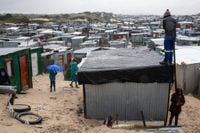The African Commission on Human and Peoples’ Rights has welcomed the enactment of South Africa's Expropriation Act of 2025, which aims to address historical injustices and promote equitable access to land. This landmark legislative reform is seen as a significant step toward achieving socio-economic rights as guaranteed under the African Charter on Human and Peoples’ Rights.
On May 7, 2025, the Commission praised the South African government for this critical initiative, emphasizing the need for equitable access to land and the redress of historical injustices. The Expropriation Act establishes a unified legal framework for expropriation across local, provincial, and national levels of government, effectively repealing the outdated 1975 Expropriation Act.
Key provisions of the new law include safeguards against arbitrary expropriation, such as mandatory prior negotiations, notification procedures, and access to judicial review. Furthermore, the Act ensures just and equitable compensation, allowing for expropriation without compensation only in narrowly defined circumstances, like abandoned land or land acquired with state subsidies.
Commissioner Solomon Ayele Dersso, the Country Rapporteur on South Africa, noted that the Act affirms the right to land as a means of addressing the legacy of apartheid-era dispossession. He stated, "These reforms mark a vital step toward addressing the deeply entrenched structural inequalities arising from colonial and apartheid-era land dispossession."
The Commission also commended the extensive public consultation process that preceded the Act's adoption, aligning with human rights standards of the African Charter. It called for the effective implementation of the Expropriation Act, urging the South African government to provide adequate institutional support and capacity-building for vulnerable groups.
Moreover, the Commission encouraged all stakeholders, including traditional authorities and civil society, to engage constructively in the implementation of the Act. This collaborative approach aims to promote socio-economic justice, equitable access to land, and national reconciliation.
As South Africa continues to grapple with its complex socio-political landscape, the government of national unity (GNU) formed after the ANC lost its outright parliamentary majority in the May 2024 elections has become a focal point for political accountability and inclusivity.
The GNU model has proven capable of fostering collaboration among parties, compelling them to negotiate and serve the public interest. This dynamic was recently illustrated during discussions over a proposed VAT increase, where Finance Minister Enoch Godongwana's suggestion faced fierce opposition from various political factions.
The Democratic Alliance (DA) and Freedom Front Plus led the charge against the VAT hike, arguing it would disproportionately burden struggling households. In response to the overwhelming resistance, the ANC abandoned the proposal, showcasing the GNU's capacity to prioritize public welfare over unilateral decision-making.
International examples of coalition governments, such as Kenya's unity government formed after the 2007 election crisis and Malaysia's 2022 unity government, have demonstrated the potential for stability and economic recovery through power-sharing arrangements.
However, the GNU is not without its challenges. In municipalities like Johannesburg and Tshwane, infighting among coalition partners has occasionally stalled service delivery. Yet, the coalition model remains a preferable alternative to single-party dominance, which often breeds complacency and corruption.
As South Africa approaches the 2026 elections, voters are likely to reward parties that demonstrate tangible results, particularly in addressing unemployment, crime, and infrastructure decay. Home Affairs Minister Leon Schreiber's aggressive stance against corruption has resonated with voters, showcasing the GNU's commitment to accountability.
Meanwhile, the ongoing discussion around South Africa's socio-economic transformation remains a pressing issue. Yeshiel Panchia, in a recent article, emphasized that despite nearly 31 years post-apartheid, effective legislation for economic redress remains unfulfilled. He argues that genuine transformation is essential for South Africa's economic and social stability.
Stephen Grootes has suggested that political forces may be shifting away from controversial Black Economic Empowerment (BEE) policies, seeking more viable alternatives. This evolving discourse is critical as South Africa navigates its path toward a more equitable society.
In a recent announcement, the South African government plans to launch a R100 billion Transformation Fund aimed at promoting broader black participation in the economy. The fund, expected to be operational in the coming months, will aggregate contributions from existing Enterprise and Supplier Development obligations under the Broad-Based Black Economic Empowerment Codes of Good Practice.
Deputy President Paul Mashatile introduced the fund on May 5, 2025, stating that it will promote sectors identified as critical to job creation and industrial development, including renewable energy, mining, and information and communication technology.
Despite the fund's ambitious goals, critics have raised concerns about its feasibility, citing the government’s track record on corruption and the challenges faced by existing institutions aimed at similar objectives. Business Leadership SA CEO Busi Mavuso described the fund as "half-baked," questioning its potential to deliver meaningful outcomes.
Stuart Theobald of research firm Krutham echoed these concerns, emphasizing the need for specific targets and a clear understanding of the obstacles to achieving desired outcomes. Theobald argued that without a thorough analysis of existing initiatives, the fund risks repeating past mistakes.
As South Africa continues to grapple with its socio-economic challenges, the launch of the Transformation Fund and the ongoing discourse around economic redress highlight the urgent need for effective solutions. The interplay between political accountability, coalition governance, and socio-economic transformation will shape the future of South Africa as it strives for a more equitable and just society.
In summary, South Africa stands at a crucial juncture, with the Expropriation Act of 2025 and the establishment of the government of national unity signaling a commitment to addressing historical injustices and fostering inclusive economic growth. The journey toward genuine transformation is fraught with challenges, yet it remains a vital pursuit for the nation's future.




